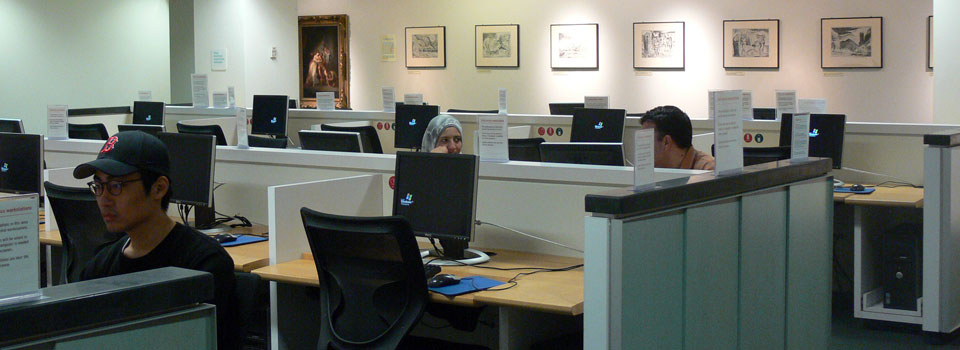Policy on the Appropriate Use of Information Technology
Victoria University Library is committed to ensuring a working and learning environment in which all persons treat others with humanity and respect. The Library’s information technology facilities include computing devices and associated peripherals, communications infrastructure and related equipment, multimedia devices and all forms of software.
Such resources and tools are made available to students in support of their respective academic objectives and requirements.
Their use is circumscribed by codes such as the Code of Student Conduct, the Code of Behaviour for Academic Matters, the Ontario Human Rights Code, and the Criminal Code of Canada in concert with various rules and guidelines adopted locally.
Every user bears primary responsibility for the material he or she chooses to access, store, print, send, display or make available to others. The facilities may not be used in any manner to create, store, send, display or make available to others material which contravenes the relevant policies or statutes. When devices, such as portable computers, are the property of the user, the appropriate use expectations still apply when such devices are used to access University information technology facilities.
Failure to adhere to these guidelines may result in the suspension of access privileges as well as other action as deemed appropriate by Victoria University Library, Victoria University, University of Toronto Computing and Networking Services and/or the University of Toronto.
Victoria University Library subscribes to the official University of Toronto policy on Appropriate Use of Information and Communication Technology. This page provides general guidance on several aspects of that policy.
Appropriate use of information technology includes, for example:
- respect for the rights of others
- respect for the property of others
- consideration of other persons using shared systems, equipment and facilities
- confidentiality in use of passwords and personal identification numbers
- a presumption of the right to privacy
- use of tools for the purpose for which they are intended
- adherence to the rules governing use of accounts, equipment, networks, or other facilities, whether the rules are established by the Victoria University Library, the University of Toronto or by the organization providing these tools to the University
- adherence to etiquette and culture as defined in systems that you use
Inappropriate use of information technology includes, for example:
- unauthorized access, alteration, destruction, removal and/or disclosure of data, information, equipment, software or systems
- deliberate over-extension of the resources of of a system or interference with the processing of a system
- disclosure of confidential passwords, personal identification numbers and/or access devices or information for accounts, equipment, and telephone voice mail
- use of University facilities and resources for commercial purposes
- propagation of hate literature
- propagation of pornographic materials
- harassment, including sexual harassment
- theft of resources
- malicious or unethical use, particularly of e-mail facilities
- recreational games, chat-lines, overuse of network-accessible discussion lists or file-transfer site
- use that violates provincial or federal laws
Victoria University Library cannot act as a censor of information available on our campus network but will investigate properly identified allegations arising from the University community.
Guidelines Regarding the Issue of Potentially Offensive Material
These guidelines address the issue of potentially offensive information on the University’s computer systems, whether generated locally or imported from other systems via the Internet. Other than the particular modality of the computer and network, the issues to be addressed are not generally technical. Any guidelines or procedures for handling this particular situation address only a single facet of a much broader policy issue regarding the production, storage, dissemination of and access to information available using information technology facilities. Rather than dealing with the global issue, these guidelines (in this section) focus only on handling, dissemination and display of objectionable material.
A guiding principle is that the University will ensure that its efforts to create an environment in which all its members treat each other with respect extend to facilities and activities associated with information technology.
There are wide variations in the range of things to which people take offense. What may be offensive to one person may seem innocuous or even informative to another. Generally, a person’s access to a particular piece of information will not be proscribed simply because someone else finds it offensive. On the other hand, no one should be involuntarily presented with information which the person transmitting it should reasonably know would be viewed by the recipient as offensive or insulting.
In situations where a member of the University community is presented, through the network, with offensive material without consent having been either sought or granted, the incident will be investigated and appropriate action will be taken. Such action may include, for example, referring any information about the incident to the faculty, office, or college, or assisting the complainant in bringing action under the appropriate university code of behaviour. Relevant policies include the Code of Student Conduct and the Sexual Harassment Policy, among others.
Personal Privacy
Generally, with respect to computing accounts established for students, faculty and staff there is a presumption of privacy. Under certain circumstances, access to files is authorized by University policy, or , for example, certain student files may be accessed by instructors as part of course requirements. However, if an infraction is suspected, the appropriate officials at the University of Toronto will investigate the matter and, if circumstances warrant, proceed to investigate the traffic and files associated with the suspected infraction in accordance with the applicable University policy or procedure.
Last updated: November 16, 2018
 Ask Us
Ask Us
